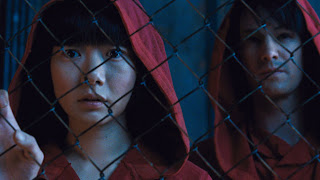"Yesterday, I believe I would never have done what I did today."
Each segment has its own unique personality, and it could be inferred that each of the six segments represents a life. One life's timeline intersects, influences, and alters others. Meeting new people or even our interactions with loved ones have the ability to elicit dramatic shifts in the course of our lives. The same is true of Cloud Atlas. Characters who make poor choices in a given situation might not experience consequences until much further down their life's timeline. Characters' actions in the 1800's have a ripple effect that extends to the distant future. The same is true of our lives. The mistakes or misjudgments in one time period are often reciprocated in subsequent decades; it's a fancy way of saying 'history repeats itself' but also that people are faced with similar emotional and ethical dilemmas, despite differing backgrounds. The directors definitively use cross-cutting to drive this point home and increase suspense as viewers are forced to be concerned with multiple characters in vastly different (and often dangerous) settings simultaneously.
"We cross and re-cross our old paths like figure-skaters."
While on the surface Cloud Atlas is about the connection between humanity across millennia, it could also be read as a celebration of various cinematic genres and an argument that "genre" is becoming an increasingly complicated notion as many films fall under multiple cinematic categories. Each segment reinforces recurrent themes: courage in the face of evil, refusal to "let go" of love past or present, the idea of destiny ("do you ever feel that the universe is against ya?"), etc. But as mentioned previously, each segment has a distinct personality and is largely grounded in a specific genre:
- 1846 - historical fiction at sea
- 1931 - forbidden, secret love affair expressed via letters
- 1974 - 70's detective thriller investigating potential government scandal
- 2009 - comedic British story about an aging man aching to regain his youth
- 2144 - futuristic sci-fi story about the line between human and machine
- 2346 - post-apocalytic setting that blends the ancient with the distant future
Blending the six stories together effectively blurs the very idea of genre, suggesting that similar stories can be told under the guise of different costuming, time period, makeup, and setting.
This shot with Somni-451 behind the fence evokes feelings of helplessness and the sense of being "trapped." The character is soon compelled to take action after facing the stark brutality before her.
A movie like Cloud Atlas provides much to talk about after the credits roll. I only present a fraction of that discussion here. It's a film about fate, chance, reincarnation, love, emotion, and kindness (to name a few) and their impacts on the human experience. Suffice it to say that I admire such grand vision & collaboration and thoroughly enjoyed this giant piece of cinema.
Note: stick around for the credits, which reveal the 6 characters that the lead actors portray. Some are sure to surprise.
5 out of 5



No comments:
Post a Comment